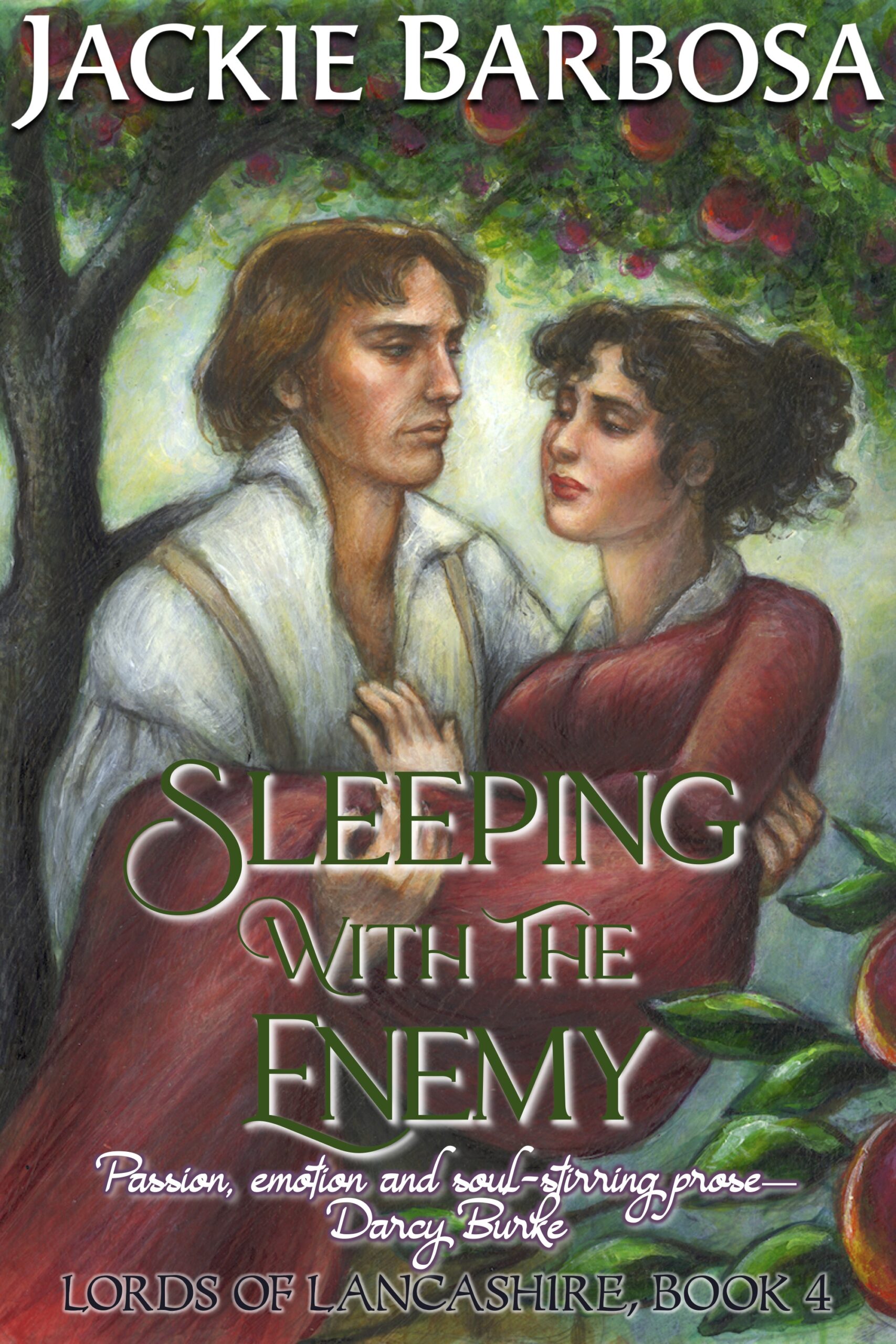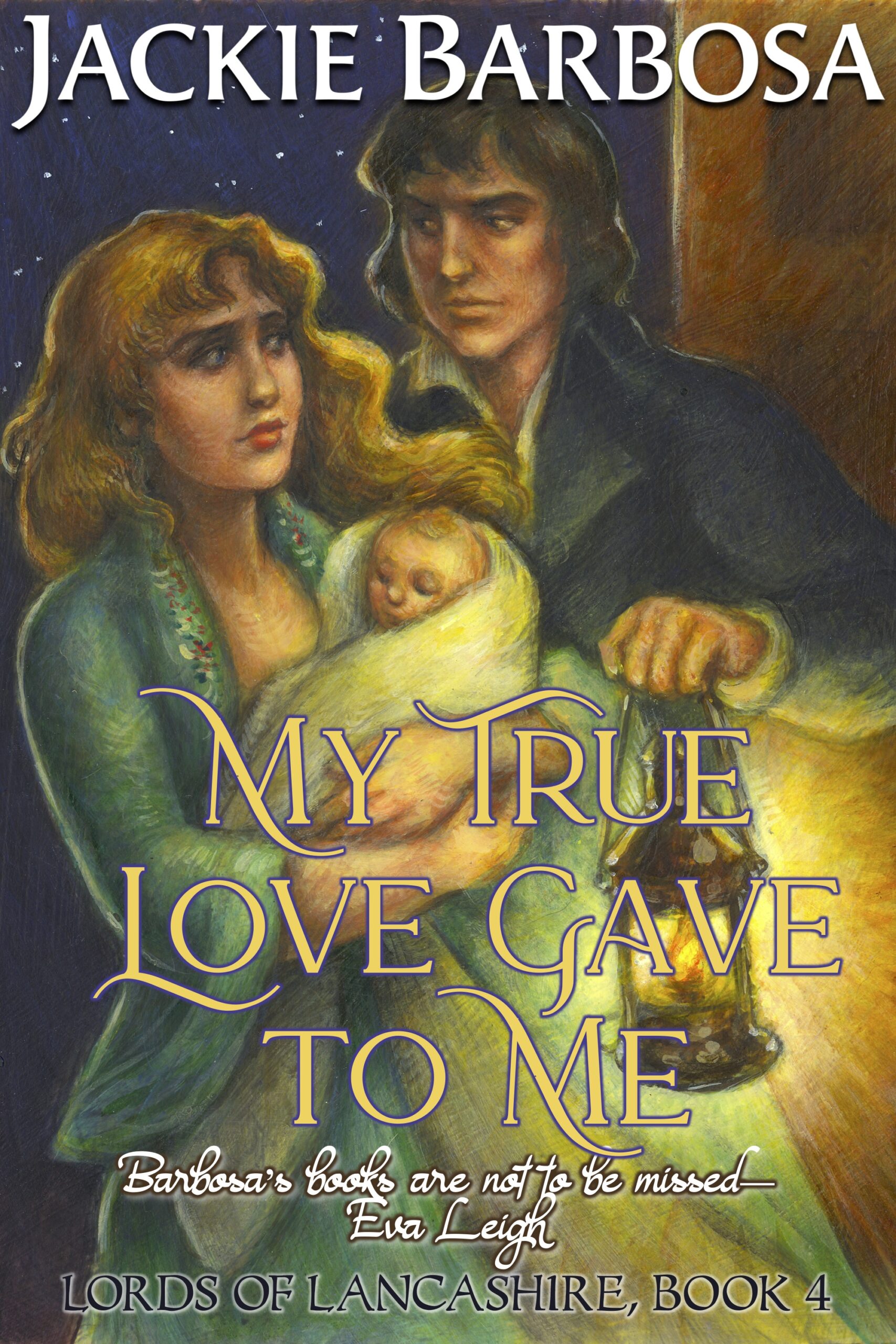Historical and Contemporary Romance Author

Sleeping with the Enemy
Book 4 of the Lords of Lancashire Series
Scribd audiobook | Scribd ebook
When Laura Farnsworth discovers the blood-stained body of a man wearing the distinctive red coat of the British army, her first instinct is to let dead dogs lie. But then the man proves himself to be very much alive by grabbing her ankle and mumbling incoherently.
After twenty-five years in His Majesty’s service, Lieutenant Colonel Geoffrey Langston never expected to wake up in heaven, much less being tended an angel. Not to mention an angel who happens to be American. As the long-widowed Laura nurses him back to health, the attraction between them heats from a simmer to a boil. He should be working to find his way back to his regiment and from there, to England. Instead, he’s sleeping with the enemy–and thereby committing the crime of desertion if not treason. But then, who’s going to find out? If only his family didn’t refuse to take “missing in action” for an answer.
(Previously published as The Soldier’s Forbidden Lover.)
Book Details:
Series: Lords of Lancashire #4Release Date: 9/15/2020
Publisher: Circe Press
eBook ISBN-13: 978-16482624-2-5
Excerpt
One
Plattsburgh, New York—September 13, 1814
It was the flicker of red in her peripheral vision that first caught Laura Farnsworth’s attention. A bright, unnatural red that didn’t belong in the tangled underbrush of the forest that lined the narrow dirt road.
“Daniel.” She placed her hand on her son’s arm to draw his attention. “Stop the wagon.”
He drew back on the reins, slowing the horses, even as he turned a querying gaze on her. “What for?”
In answer, Laura pointed toward the patch of red that peeked out from between the trees on the left side of the road. “What do you suppose that is?”
Her son squinted as if doing so would help him answer her question, then shrugged. “I don’t know. But surely it’s none of our business.”
“Maybe not,” she admitted, rising from her seat on the hay wagon’s bench, “but I’d like to have a closer look just the same.”
“Wait.” Daniel’s tone carried a trace of fear. “It could be some kind of trap.”
Laura kept moving, gathering her skirts to avoid tripping as she stepped off the wagon. “The battle ended two days ago. If the British were laying traps for average citizens, I should think we would have encountered one before now.”
“Still…”
She turned her most quelling maternal gaze on him. “I will thank you to remember who is the parent and who is the child here.” Granted, she had a hard time thinking of her seventeen-year-old son as a child, given that he was a head taller than she and broad as an ox. It had been years since she’d been able to get him to obey her by physical means, which meant she learned a long time ago how to enforce her rules by moral authority alone.
He sighed and set aside the reins. “Fine. I’ll come with you.”
Laura waited while he clambered down and then began picking her way through the undergrowth. When she got close enough to make out what she was looking at, she gasped.
Lying face down on the carpet of leaves and branches was the body of a man clad in the red coat and black breeches of a British soldier. The back of the coat was spattered with brownish splotches that could only be dried blood. His hair, a pale shade of brown that reminded her of fresh apple cider, was also matted with blood at the base of his skull. He must have taken a terrible blow to the back of the head during the fighting and somehow managed to make his way here, where he had expired, miles from the battlefield.
Poor man. No one deserved to die alone and lost like this, not even an enemy soldier. And his family should know what had become of him. Have the opportunity to bury him.
Damn this war, she thought fiercely. So many lives had been lost already on both sides, and for what? Yes, the British were very much in the wrong when it came to their practice of impressing American sailors into naval service, but was the harm really sufficient to justify so much bloodshed? Surely reasonable adults should be able to resolve such a dispute without resorting to killing each other. And after two and a half years, it was painfully obvious that nothing was being accomplished, save for death and destruction.
She turned to look at her son, whose complexion had gone ashen pale. Daniel was hardly a stranger to death, having lost his father at the tender age of seven, but Laura had taken a good deal of care to protect him from the more unpleasant aspects of her husband’s passing. Certainly, Daniel had never before seen a dead person who hadn’t been prepared for burial, and the obvious violence that had been done to this man before he’d died was shocking, even to her.
“At least he’s out of pain and at peace now,” she said gently. “We will have to drive back to town and tell Reverend Shackleford about this. He’ll be able to get a message to Fort Moreau so they can come retrieve the body and return it to the British.”
Daniel’s nod was slow, but his color improved. “Makes sense. But…shouldn’t we do something to try to protect the body from scavengers?”
That was a good point. It would be hours before anyone from the fort would arrive to collect the corpse.
In fact, now that she thought about it, the man must have expired quite recently, for there was no hint of predation. Nor, come to think of it, did she detect any of the foul odors she associated with death. Though she could perceive no signs of life at this distance—no rise and fall of chest, no twitch of limbs or digits, no breath stirring the leaves beneath him—perhaps she should take a closer look, just to be certain.
Lifting her skirts again, she edged through the brambles until she was near enough to the body to stoop down and touch it.
“Mother?”
“We should be su—” Her words ended on a startled shriek, because the corpse’s hand shot out and grabbed her ankle, large fingers closing tightly around her boot.
“Mother!” Daniel’s panicked tone echoed her own as he thrashed his way to reach her side.
The dead man was most certainly not dead, but quite alive, and his steely grip easily resisted her efforts to pull free. Daniel caught her by the shoulders to keep her from toppling over as she continued to yank against the man’s grasp. Over the wild pounding of her heart—not so much the result of fear as of surprise—she could hear the man’s voice, thick and raspy, as he mumbled words she couldn’t make out but understood well enough, despite their incoherence.
Help me. Please.
“It’s all right,” she reassured her son as her shock subsided to be replaced by concern and compassion. “He isn’t hurting me, and he certainly can’t hurt you in his condition.” She ceased trying to loosen the man’s grasp on her ankle and bent her knees to get closer to him instead. Placing a gentle hand on his shoulder, she said, “Have no fear, sir. You’re safe now.”
At her words, his grip relaxed and his mumbling ceased.
He had slipped back into unconsciousness.
***
Getting the wounded man—who, based on the epaulettes on the shoulders of his coat, must be an officer, not an enlisted soldier—from where he lay to the wagon was no mean feat. Daniel might be large and strong for a young man, but the British officer was nearly as big as her son and a dead weight, to boot. Daniel could not have carried the man more than a few staggering steps without Laura’s assistance.
Although she worried about doing further injury, she and Daniel had no choice but to roll the man over onto his back before moving him. He groaned in what was undoubtedly pain as they turned him but roused no further.
Laura couldn’t prevent herself from drawing in a sharp breath at her first glimpse of his face, for though his bronzed skin was smudged with dirt and his eye sockets had the sunken appearance she associated with a prolonged lack of water, none of this detracted from the arresting masculine beauty of his features. Several days’ worth of stubble covered his strong, square jawline, which was punctuated by a tidy cleft in his chin. He had sharply delineated cheekbones and a well-proportioned nose that skewed just slightly at the bridge, suggesting it had been broken at least once. His cider-colored hair was a trifle overlong and clung to his well-proportioned forehead, which made her notice that his eyes were well-spaced and possessed of thick lashes a shade or two darker than his hair. And what color were those eyes? She immediately berated herself for giving such a trivial question even a second’s consideration. What sort of woman thought about such shallow, inconsequential things when a man might well be dying at her feet?
A shameless one. Or a lonely one.
Once the man was on his back, Daniel stooped down and carefully lifted his head and shoulders while Laura grabbed his legs at the knees. Together they managed to carry him the ten yards to the wagon. Fortunately, today’s trip to town had been for household supplies, not feed for the livestock, so there was plenty of room in the bed of the wagon. The jolting journey from there to the farm would likely have been unpleasant for the man had he been awake, but he remained insensible.
And Daniel argued with her the entire way. “We should take him to the hospital at the fort. Turn him over to them. It’s not our job to take care of wounded soldiers. Especially enemy soldiers.”
“We have a Christian duty to help anyone who is sick or injured,” Laura answered. “Friend or enemy.”
“Taking him to the fort would fulfill that duty,” her son retorted stubbornly.
She glanced over her shoulder at the unconscious man. His lips were cracked and bloody, and his sun-bronzed skin had a sallow, lifeless undertone. If they hadn’t found him when they had, she doubted he would’ve survived much longer.
“He’s British, Mother,” Daniel continued, his jaw set at that stubborn angle that still reminded her of his father. Her husband, gone ten years and more. If it weren’t for their son, who looked so like him, she wondered if she would remember Samuel Farnsworth’s face at all. Sometimes, she wasn’t sure she truly did. “What if he’s not as injured as he appears and means us harm? Means you harm?”
“What if he is as injured as he appears and dies before we can get him to the fort?” Laura gave her son the hard, narrow-eyed stare she’d been using to cow him for years. To her gratification, he flinched ever so slightly. It still worked.
“He could die on the way to the farm.”
Dear Lord, she hoped not. Her throat tightened painfully at the very idea.
Something had happened in those few moments when the man she’d taken for dead had grabbed on to her and begged her for help. A tug at her heart, an answer to a longing she hadn’t even known existed inside her. This man needed her. And it had been so long since anyone had truly needed her.
Oh, certainly, she felt she was useful. Her life was positively chock-full of activity, sunrise to sundown. Running both the household and overseeing the day-to-day operation of the farm kept her busier than a flail on threshing day, and there was always someone who wanted an answer to this or a decision about that.
But the reality was that very soon, Daniel would take control of the farm. He was, in fact, perfectly capable of managing things himself now, though by legal formality, the farm would not become his until his twenty-first birthday. But whatever the law might have to say about it, Daniel did not need her help any longer, and Laura rather suspected that should she up and vanish, he would quite handily sort out the household side of things as well. She’d raised a competent son, as she’d intended. She just hadn’t realized what would happen when his competence equaled her own. How…empty it would make her feel.
And then, there he had been, a person in desperate need of someone to do the right thing, and that someone seemed to be her.
Not that there was any way she could possibly explain this to her son, whose concern was not entirely misplaced.
So she said, “If he does, we will know we did everything we could to save him by trying to get him to help as quickly as possible. If we take him on an hour-long journey, we will have no such assurances.”
“And what if he is too injured for you to help him? If he requires a surgeon to save his life? I know you know what you’re doing when it comes to treating common illnesses and injuries, but for all we know, he’s been shot or stabbed or has some other condition you won’t be able to do anything for. Then what?”
Laura bit her lip and visualized what she had observed when they had turned the man onto his back before transporting him to the wagon. Aside from a few drops on or near his shoulders, all of the blood on his coat had been on the back. If he had been shot or stabbed, there should have been one or more holes in his uniform, but she remembered none. All of his limbs had appeared undamaged, with no evidence that they had been broken or crushed. Everything she had seen indicated that his only injury was to the back of his head, where someone had struck him hard enough to draw a significant quantity of blood and likely fracture his skull. That could, of course, have done serious harm to his brain, but if it had, there was nothing a bonesaw could do for him that she could not. Well, short of amputating his head, she thought with grim humor, but that seemed unlikely to be therapeutic.
After a long pause, she answered Daniel’s query. “Then I will have to answer to God for my error. But given what I have seen, I believe all he needs is water and food, once he can manage it, and to be kept dry, warm, and clean so he can heal. The rest is up to the Lord.”
***
Laura’s initial visual assessment of the British soldier’s wounds proved accurate. Aside from a few scrapes and bruises likely sustained on a stumbling trek through the forest to where she and Daniel had found him, the only injury was to the base of his skull. The blow must have been delivered in close quarters when his back had been turned, which seemed an odd way for a soldier to come to harm in a battle that had been fought mostly by mortar and gunfire; but then, she supposed it was possible for hand-to-hand combat to occur even under those circumstances. The incongruity bothered her nonetheless.
After Daniel and Joseph Robinson, the freeborn Black man who was her foreman and orchardist, had undressed the man, bathed and clothed him according to her specifications, and then tucked him into the bed in the downstairs bedroom—her bedroom, normally—Laura undertook the task of his day-to-day care while continuing to tend to her usual chores. Although none of them were familiar enough with military insignia to guess at the man’s precise rank, the star and crown on his epaulets suggested he held a position of some importance. Despite the fact that British forces had decamped from the area, Laura could not imagine that no one would be looking for the missing officer. As one day stretched into the next and then into another, however, her concern that soldiers might turn up on her doorstep demanding to know what she’d done with the wounded man faded, to be replaced by concern that he stubbornly continued to not wake up.
Though he reflexively swallowed the small amounts of water and meaty broth she dribbled into his mouth several times each day and managed the other routine bodily functions often enough that she no longer worried he would die as a direct result of injury or infection, as two days turned into three and then became four, she had to face the very real possibility that the damage to his brain had been severe enough that he would never regain consciousness. At some point, water and broth would no longer be sufficient to sustain him, and he would die.
Perhaps Daniel had been right. Perhaps they should have taken him to the fort. At least then, it wouldn’t be her burden to watch another man die by inches despite her efforts to save him.
It didn’t help that every day, Daniel pointed out that there was no reason they could not transport the man to the fort’s hospital now. His condition, while not improving, was clearly stable enough to allow for the journey. Wouldn’t he be better off in the hands of people whose job it was to treat the sick and wounded?
The worst of it was that she knew her son wasn’t wrong. There was no reason for her to continue pouring so much of her time and effort into caring for a complete stranger. A man whose name she did not know and who, if he regained consciousness, would likely consider her an enemy. A man she ought to consider her enemy, given that the United States and Britain were at war.
Part of the reason she resisted was sheer pigheadedness. Laura liked to succeed. After Samuel’s death, she’d thrown herself first into raising their son and then into transforming the family farm from a subsistence-level operation into a money-making enterprise. This she had accomplished by quadrupling the size of the apple orchard and planting varieties good for making cider, which she sold to the local taverns and townspeople alike at a healthy profit. The first few years had been difficult, of course. She’d had to take all her hay fields out of production to plant the new trees, so meant she had to purchase hay for the livestock rather than growing it herself while at the same time waiting for the trees to reach maturity. Nevertheless, she persevered and now the farm made a tidy profit each year, which she reinvested into the continued expansion of the orchard and the equipment to press and age her cider. Giving up simply did not suit her, and turning the wounded officer over to military doctors would be an admission of defeat.
But the lion’s share of the reason was that caring for the injured man gave her purpose. Made her feel needed again, in a way she hadn’t since Daniel had been a young boy. It wasn’t that she wished to baby her son or keep him eternally dependent on her. Quite the contrary—the point of raising children was to ensure they could fend for themselves as adults. But once Daniel was a man and took over ownership of the farm, what would be left for her? Paradoxically, succeeding in the most meaningful task she had ever taken on in life would render her redundant. If Samuel were still alive, she was sure she would feel differently, for her husband had needed her—and she him—in ways that could not be outgrown. But he had died, and here she was, fading into insignificance.
And ever since she’d found the injured, she’d been plagued with questions. How had he been injured? How had he come to be lying in the woods near her home, miles from the battlefield? What was his name? Where was he from? Did he have a wife and children?
What color are his eyes?
And so each night, she promised herself that if he did not waken on the morrow, they would do as Daniel wanted and take him to the fort. And each day, she utterly failed to do so.
Until mid-afternoon on the fifth day.




